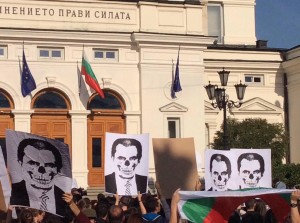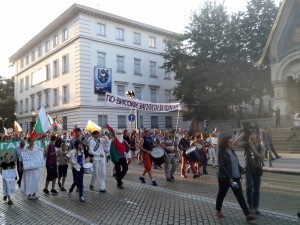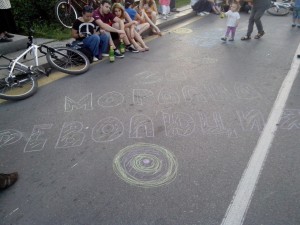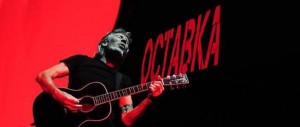This week a photo featuring a crying girl and a policeman during the protests in Sofia has gone viral on social media. Until that picture was shown, not many people had been aware of the protests. As today is already the 156th day of the protests, it is high time to show the world what is going on in Bulgaria. The AEGEEan asked Atanas Nachkov from AEGEE-Sofia about it.
 Can you tell me the facts behind the protests that are going on in Bulgaria right now? When did it all start?
Can you tell me the facts behind the protests that are going on in Bulgaria right now? When did it all start?
Atanas: In May we got a new government after a temporary one, because the previous one had resigned in February after relatively big protests from mostly poor people, who were unable to pay their electricity bills for January. So, as a result of the earlier elections, they remained the biggest party in the Parliament, but couldn’t form a government due to the lack of majority. After that, all the trouble started.
The new government, led by Plamen Oresharski and consisting of some ministers who are not linked to a political party, was supported by the Socialist party (BSP), a movement for freedom and rights (DPS), and a xenophobic party called “Ataka” (attack). On June 14th, the leader of the socialist party proposed to the Parliament a media tycoon to be the chairperson of the State security agency (DANS). He is 33 and has never been active at all: his mother is the actual businessperson. That same day an open call for a protest was initiated on Facebook.
What happened then?
The protest was scheduled at 18:30, after working time. Basically, the candidature was withdrawn the day after that first rally, but the protests continued for every day at the same time. Most of the people who started to gather were young and middle-working-class people, chanting for transparency, accountability, responsibility and other democratic values, behind the word ‘ostavka’, which means ‘resignation’. The protests looked more like street performances, but the whole nation was following what was going on. The amount of people went from 500 to 30,000 only in Sofia, depending on the weekday, which is kind of a lot for here.
 A lot of new democratic initiatives emerged, e.g. electronic discussion for bills. However, the government did not respond and some deputies brought out some arrogant words to the protesters. But, as I said before, even though these were huge protests for Bulgaria, the Parliament’s support still is less than 10%. By the way, a lot of stories like the one with the crying girl and policeman were true, like the one from people giving flowers to policewomen and water and food to all guards. The French and the German ambassadors made a common statement, where they declared that they supported the protestors. The Belgian and the Dutch made it only orally and on interviews. The British also responded against the appointment.
A lot of new democratic initiatives emerged, e.g. electronic discussion for bills. However, the government did not respond and some deputies brought out some arrogant words to the protesters. But, as I said before, even though these were huge protests for Bulgaria, the Parliament’s support still is less than 10%. By the way, a lot of stories like the one with the crying girl and policeman were true, like the one from people giving flowers to policewomen and water and food to all guards. The French and the German ambassadors made a common statement, where they declared that they supported the protestors. The Belgian and the Dutch made it only orally and on interviews. The British also responded against the appointment.
For how long did the protests go on?
In Summer it declined and eventually only a few people went to protest. But now, when the school year started a bunch of young students decided to occupy the biggest auditorium in the University of Sofia. A lot of other students supported them almost immediately, as well as some well-known lecturers. After one week, the one before the Agora, they occupied the whole university and this rushed a wave of occupations of other rooms in other universities. They formed an alliance altogether and have the support of the university of Sofia’s authority and some of the student councils. They have made their own parliament and make decisions how to continue with the protests. They demand more moral, less corrupted and transparent government as well as the ostavka of the current one. They protest during work hours till night time almost each day.
On Tuesday there was a protest, but there were a lot of policemen, I’ve never seen so many. But if it wasn’t for them, the deputies would never be able to go out from the Parliament safely. Some students got hurt, either because they were rioting too harshly or because the police was already too arrogant. On Wednesday there were protests against the violence from the police.
What are the reasons behind the protests? What are the Bulgarians fighting for?
Bulgaria is the poorest EU member, a semi-consolidated democracy, has a corrupted media and partially banking system, but most importantly – very insolent politicians. The last election results showed that the people’s trust in the political system is below zero. The economy is comparatively growing slowly, but the fiscal discipline is too harsh. We cover 4/5 of the Maastricht criteria, but we don’t expect to get in the Eurozone in the next 10 years.
You may compare us with Turkey’s GeziPark riots (striving for democratic values), but economy also plays a big role in our protests and we don’t have problems with secularism. Except that in the fact that here’s a strong frustration with their and Egypt’s protests, because the world news agencies, showed mostly them and wrote just a few posts about us during the summer. We felt neglected, because the lack of blood (something that we were proud of) and the vivid performances were skipped. Unfortunately, on Tuesday some people got harmed.
There is a strong need for further implementation of democratic principles in the political system, but people start to realise about it just now and that’s why they are fighting for them, with very vague labels. Ostavka means only resignation, but here and now it also means that there is something really wrong with us, it can’t go on like that and it’s high time we find a solution. After the fall of the communism, it is obvious that we still haven’t found the proper way to set a prosperous state and we’re making circles in the same place, which we call “transition”. We are still learning what is active citizenship and open-mindedness.
What is your opinion about the protests? Do you believe in a change? Are you doing anything yourself?
I support them. I’m active on Facebook and sometimes I go to the protests, but at the same time I have to study for the state exams. If you check closely the Agora Zaragoza pictures of the Chair Team, you’ll see #ostavka on my laptop.
I don’t think that our politicians will change their minds, we need a whole new generation to come on stage. Even if they resign, it’s likely that the same parties will be back on the floor and this will continue. I think this will last for long time. The police are actually really scared because they are in favour of the protestors, but they don’t want to lose their jobs.
I was thinking to write to the mailing list “AEGEE-L”, but later I thought that lighting a candle is not very attractive. Moreover, the EU institutions did not react as we presumed they would.
Find more background information and a chronology of the protests here, and Atanas’ favourite opinion article about the protests here.
Pictures on the courtesy of Atanas Nachkov
Written by Marije Arentze, AEGEE-Leiden


